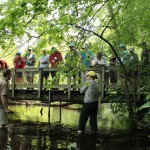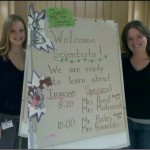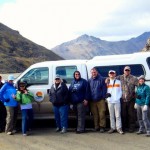During this Thanksgiving week, we want to express our thanks to volunteers Bill Krasean and Joelyn de Lima who offer helpful hands—and many hours—to our KBS LTER community. Krasean has been volunteering at the KBS LTER for over one year. “I started out volunteering at the KBS Bird Sanctuary,” said Krasean. “Then I found out the KBS LTER could use someone with experience in photography and writing, so I switched.” After working for the Kalamazoo Gazette as a reporter for almost 35 years, he retired in 2005. With an interest in scientific nature and natural history, along with a
Giving thanks for our volunteers
Discussion series gives agricultural community a chance to weigh in on climate change
A series of meetings designed by the Kellogg Biological Station Long-term Ecological Research (KBS LTER) program and Michigan State University (MSU) Extension to deepen the conversation between farmers, scientists, and agricultural professionals on a wide range of issues is proving quite a hit. In a continuing effort that began in 2012, KBS LTER Education & Outreach Coordinator, Dr. Julie Doll, and her colleagues from MSU Extension hosted three discussion events in March 2013 focusing on climate change, alternative energy, and the impacts they may have on Michigan’s agriculture and
Michigan students can now study science in the great outdoors
As part of the KBS K-12 Partnership with local school districts, the Kellogg Biological Station Long-term Ecological Research (KBS LTER) program has developed an on-site science activity that has quickly become a staff favorite: an activity trail for elementary students highlighting KBS LTER research on sustainable agriculture. The KBS K-12 Partnership goals include enhancing the content and delivery of the Michigan K-12 science curriculum and promoting improved science teaching by providing teachers with in-depth exposure to current ecology topics. At the Agriculture & Ecology Student
CO2 flux towers help assess the sustainability of biofuels
This news piece by KBS LTER volunteer and retired journalist Bill Krasean. If the United States is to develop sustainable biofuels such as cellulosic ethanol as alternatives to grain-based ethanol and the burning of climate-changing fossil fuels, there are still many questions yet to be answered. Key among those questions is where best to grow biofuel crops without sacrificing valuable farm and forestland, says Jiquan Chen, Distinguished University Professor in Environmental Science at the University of Toledo and investigator in the U.S. Dept. of Energy’s (DOE) Great Lakes Bioenergy
Small seedlings help tell a big story: reflections from an undergraduate researcher
Each summer the KBS LTER supports students to participate in the Research Experiences for Undergraduates (REU) program, funded by the National Science Foundation. This is part of a larger REU and intern program at KBS. Caitlyn Byron, a senior at Baldwin Wallace University in Ohio, writes about her REU experience working with KBS LTER scientists Drs. Tim Dickson and Kay Gross. ~~~ It is a beautiful morning in southwest Michigan, so I pause to take it in as I step out of my apartment. The birds are chirping, I can hear boats zooming across Gull Lake, and the sun is peaking through the
It’s not dirt, it’s SOIL: reflections from an undergraduate researcher
Each summer the KBS LTER supports students to participate in the Research Experiences for Undergraduates (REU) program, funded by the National Science Foundation. This is part of a larger REU and intern program at KBS. Monica Cooper, a senior at Kalamazoo College, writes about her REU experience working with KBS LTER scientists Dr. Sarah Emery and Brad Gottshall.~~~~~~~~~~~~~~~~ It wasn't often that I thought about dirt before starting my Research Experiences for Undergraduates (REU) this past June. Since then, I have learned that it’s called soil, never dirt, and I have been learning a bit
Workshop helps scientists and journalists improve climate change communication
This piece is authored by David Poulson, Associate Director of MSU's Knight School of Environmental Journalism. It was originally published on July 2, 2013 at http://j-school.jrn.msu.edu/kc/2013/07/02/workshop-helps-scientists-and-journalists-improve-climate-change-communication/. This workshop was a collaboration between the Knight School, the KBS LTER, and the Society of Environmental Journalists. __ Susan White peered through her Skype hookup in Brooklyn at the journalists and scientists gathered on the other end of the connection in West Michigan. “Can I first say hello to
When I heard the learn’d agronomer: a poem about the KBS LTER
Last week we co-hosted a climate change communication workshop at the KBS LTER with the Society of Environmental Journalists and MSU's Knight Center for Environmental Journalism. Bringing together 11 LTER scientists from across the LTER Network and 11 journalists from across the country, we explored ways to enhance communication about climate change. During one of the field tours, Dr. Merryl Alber, Project Director of the Georgia Coastal Ecosystems LTER, was inspired to write the following poem. Dr. Alber is not new to creative writing, having recently published a children's book titled 'And
Data Nuggets: small activities with big impacts for students
Guest blog post by Kellogg Biological Station (KBS) graduate students Liz Schultheis and Melissa Kjelvik The landscape of science education is undergoing a fundamental shift. Updated standards, to be followed by all science teachers in Michigan, emphasize that science is an active process: instead of the memorization of facts in textbooks, students should be taught the ability to generate new knowledge by testing hypotheses and interpreting data. In other words, students should be taught how to use the scientific method and make arguments from evidence. However, with the scientific
K-12 Partnership teachers travel to Alaska for research experience
In July and August of 2012, three K-12 Partnership teachers traveled to Toolik, Alaska to participate in a research experience as a part of the LTER Math Science Partnership. Marty Buehler from Hastings High School, Mary Grintals from Northeast Middle School, and Lisa Wininger from Plainwell Middle School all made the two-day trip up to Toolik to help collect data for the annual “Toolik Pluck.” The teachers spent long hours in the field and the lab collecting plant, soil, and microbial samples. The teachers flew from Grand Rapids, Michigan to Anchorage, Alaska, and finally to Deadhorse,
- « Previous Page
- 1
- …
- 12
- 13
- 14
- 15
- 16
- 17
- Next Page »









